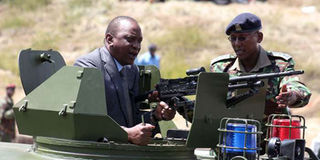Worrying key challenges facing Kenya in 2017

A member of the Kenya Police Service (right) shows President Uhuru Kenyatta how an armoured personnel carrier works at Uhuru Park in Nairobi on January 16, 2017. PHOTO | DENNIS ONSONGO | NATION MEDIA GROUP
What you need to know:
It is essential for those steering the country and those aspiring to do so in future to articulate how and when we are going to make the leap to and in excess of 10 per cent economic growth per annum.
This should be seen not just in the context of jobs and gainful opportunities but also in the overall ability and capacity to improve and increase health, education and socioeconomic welfare all round.
It is important that comments on the likely prospects for 2017 are placed in the context of the preceding years and within the framework of key socioeconomic factors.
This time last year we were numbed by the el-Adde attack in Somalia. We were understandably very conscious, indeed, nervous, of our own security.
This consideration is still very pertinent and we are frequently reminded of it. Whether we have yet significantly ratcheted up the country’s overall security regime is an open question.
Like last year we enter the year with some pressing fundamental challenges ahead. Sixty per cent of Kenyans are below the age of 24. Around two thirds of them are aged below 15 years.
We have recently been through the KCSE exam, which reminds us of the herculean demands at that level alone. Beyond that, around half of our youth are unemployed or at best underemployed.
When one pits those figures against the array of challenges facing us, one gets an idea of the monumental task ahead.
Economic growth is projected to increase by around six per cent, which in many countries would be regarded as very respectable. But quite honestly it is inadequate for Kenya in comparison to the demands the country is facing.
It is, therefore, essential for those steering the country and those aspiring to do so in future to articulate how and when we are going to make the leap to and in excess of 10 per cent economic growth per annum.
OVERALL ABILITY
This should be seen not just in the context of jobs and gainful opportunities but also in the overall ability and capacity to improve and increase health, education and socioeconomic welfare all round.
Whilst we are likely to be caught up in more immediate concerns and issues in the coming elections, we must not forget these fundamental challenges and any others that are not directly related to the election.
Beyond them, what are some of the other, more burning challenges confronting us? One is, no doubt, the shortfall of rains and the drought and famine that is enveloping vast swathes of the country.
This is causing massive human hardship, ranging from fast rising food prices and increases in the cost of living to more and more schools being unable to reopen and provide even the basic services.
Unfortunately, this is likely to get a lot worse over the next few months at least and will test our emergency resources and capabilities.
Another is the all-pervasive drug of corruption. Whatever the official boasts about tackling corruption it is ferociously gnawing away at our standards of living and overall wellbeing as well as reducing our economic progress by up to a couple of percentage points a year.
BY NOW
One way to look at it is we could be in the 10 per cent plus economic growth per annum league by now if it were not for corruption. Another handbrake on development is the increasing government debt, both domestically and internationally. A way to look at this is as if your pay slip faced an automatic deduction of 50 per cent due to the loans and interest payments you have to fork out each and every month.
On the converse side, we all experience the inadequacies and deficiencies of services provided by the various levels of government due to insufficient budgeting and resources.
Another that is likely to rear its head this year is the downside of the interest rate capping legislation. One of the major ones is that private sector borrowing is likely to be contained and is at risk of contracting as a result. Considering the private sector is one of the major engines of the economy this is a risky route to be taking.
Last, but not least, there is the rising political temperature itself. If this gets to the level of spilling over into the realm of civil unrest and at worst, violence, then we are likely to have a very rough time, indeed, both politically and domestically.
Robert Shaw is a public policy and economic analyst.





